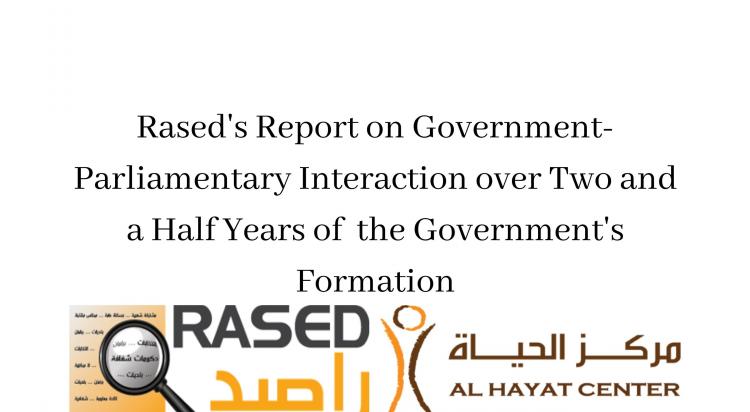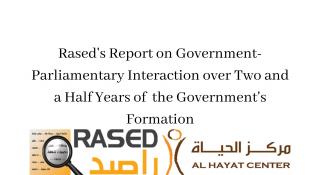RASED's report on government-parliamentary interaction after two and a half years of government formation

-
52% of the Parliamentarians (MPs) believe that the government has been able carry out its responsibilities in an intermediate extent to a higher extent.
-
39% of the parliamentarians are not satisfied with the government's follow-up and coordination with the parliament.
-
32% of MPs are moderately satisfied with the government's handling of the political reform file.
-
51% of MPs are satisfied with the government's handling of the file of human rights and freedoms, from a medium to a large extent.
-
67% of the MPs see the government remaining, and 33% of them see it departing.
-
27% of the MPs believe that the government has not practiced transparency and has not made information available to citizens and the media.
-
58% of the parliamentarians are not satisfied with the government's handling of the employment and unemployment file.
-
41% of the parliamentarians are not satisfied with government communication with citizens.
-
313 parliamentary questions were received by the government, 85% of which were answered.
-
The Ministers of Finance and Health received the most parliamentary questions.
-
Bani Mustafa, Karishan, and Ash-Shaboul are the ministers with the highest attendance at parliamentary sessions.
The results of the Rased Center's report on monitoring government-parliamentary interaction reveal the opinions of parliamentarians regarding the performance of the Khasawneh government over two and a half years since its formation. The report gathered responses from 115 parliamentarians, while 5 parliamentarians chose not to answer, and the research team was unable to reach 10 parliamentarians.
The results indicate that 52% of the parliamentarians assessed the government's ability to fulfill its responsibilities and commitments over two and a half years of its formation to be moderate to significant. Among them, 17% considered the government highly capable, while 35% rated it as moderately capable. On a related note, 48% of the parliamentarians evaluated the government's capacity as limited to weak, with 32% perceiving it as weakly capable and 16% finding its capacity to be limited.
Regarding satisfaction with the government's handling of the political reform file, the report revealed that 55% of the parliamentarians expressed moderate to high levels of satisfaction. Among them, 23% were highly satisfied, 32% were moderately satisfied, 21% were weakly satisfied, and 24% expressed dissatisfaction. Similarly, regarding the government's dealings with political parties, 48% of the parliamentarians expressed moderate to high levels of satisfaction. Among them, 20% were highly satisfied, 28% were moderately satisfied, 29% were weakly satisfied, and 23% expressed dissatisfaction.
Regarding the government's handling of emerging crises and challenges, the results showed that 43% of the parliamentarians believed it dealt with them to a moderate to significant extent. This included 18% who considered the government's handling as significant and 25% who regarded it as moderate. On the other hand, 31% believed the government was weak in dealing with challenges, and 26% saw its capacity as limited. The report also highlighted that 51% of the parliamentarians expressed moderate to high levels of satisfaction with the government's handling of human rights and freedoms over two and a half years since its formation. Among them, 14% were highly satisfied, 37% were moderately satisfied, 25% expressed low satisfaction, and 24% expressed dissatisfaction.
When asked about the future scenario for the government, 67% of the parliamentarians believed it would continue, with 9% expecting an extensive reshuffle, and 21% anticipating a limited reshuffle. Conversely, 37% of the parliamentarians did not foresee any changes or modifications to the government, while 33% believed the government would not continue.
Regarding satisfaction with the government's follow-up and coordination with the Parliament over two and a half years since its formation, the results showed that 15% of the parliamentarians were highly satisfied, 18% were moderately satisfied, and 28% expressed weak satisfaction. Additionally, 39% of the parliamentarians were not satisfied with the government's follow-up and coordination with the Parliament.
Furthermore, 76% of the parliamentarians expressed satisfaction with the legislation presented by the government to the parliament, ranging from moderate to high levels of satisfaction. Among them, 33% were highly satisfied, 43% were moderately satisfied, 14% expressed low satisfaction, and 10% were dissatisfied. It is worth noting that the Parliament approved 19 legislations during the second regular session.
Regarding the agriculture and food security file, 43% of the parliamentarians expressed moderate to high levels of satisfaction. Among them, 13% were highly satisfied, 30% were moderately satisfied, 29% expressed low satisfaction, and 28% were dissatisfied. Moreover, 8% of the parliamentarians were satisfied with the government's handling of the employment and unemployment file, 7% were moderately satisfied, 27% expressed low satisfaction, and 58% of the parliamentarians were dissatisfied.
Regarding government communication with citizens, the results showed that 28% of the parliamentarians were moderately to highly satisfied. Among them, 12% were highly satisfied, 16% were moderately satisfied, 31% expressed low satisfaction, and 41% were dissatisfied.
The report also revealed that 40% of the parliamentarians perceived the government to have practiced transparency and provided information to citizens and the media to a moderate to significant extent. Specifically, 16% believed it had been practiced to a large extent, 24% to a moderate extent, 33% weakly, and 27% not at all.
When it comes to satisfaction with the public sector modernization plan, 38% of the parliamentarians expressed moderate to high levels of satisfaction. This included 12% who were highly satisfied, 26% were moderately satisfied, 25% expressed low satisfaction, and 37% were dissatisfied.
Regarding the government's interaction with parliamentary oversight tools, the report stated that the government received 313 parliamentary questions during the second regular session, with 85% of them answered. As for interpellations, the government responded to 6 out of 12 interpellations, resulting in a 50% response rate, while the remaining 50% were left unanswered.
By tracking the parliamentary questions, it was observed that the Minister of Finance received the highest number of questions, totaling 46. The Minister of Health followed with 38 questions, and the Minister of Higher Education and Scientific Research received 30 questions. Similarly, the Minister of Finance had the highest number of unanswered questions, with a total of 9. The Minister of Higher Education and Scientific Research had 6 unanswered questions.
Regarding interpellations during the second regular session, the Minister of Health received the highest number, with 4 parliamentary interpellations. The Minister of Finance followed with 3 interpellations, and the Minister of Education, Higher Education, and Scientific Research received 2 interpellations.
In terms of ministerial attendance in the sessions of the Jordanian Parliament during the second regular session, the Minister of Political and Parliamentary Affairs had the highest attendance rate, attending 70% of the sessions. The Minister of Social Development followed with an attendance rate of 63%, and the Minister of Local Administration with an attendance rate of 60%. The Minister of Government Communication ranked fourth with an attendance rate of 57%.


